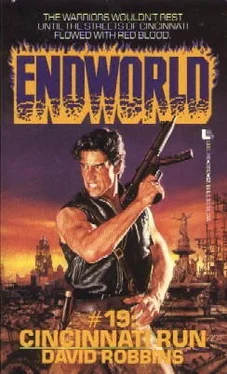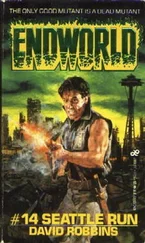David Robbins - Cincinnati Run
Здесь есть возможность читать онлайн «David Robbins - Cincinnati Run» весь текст электронной книги совершенно бесплатно (целиком полную версию без сокращений). В некоторых случаях можно слушать аудио, скачать через торрент в формате fb2 и присутствует краткое содержание. Город: New York, Год выпуска: 1989, ISBN: 1989, Издательство: Leisure Books, Жанр: sf_postapocalyptic, Боевая фантастика, на английском языке. Описание произведения, (предисловие) а так же отзывы посетителей доступны на портале библиотеки ЛибКат.
- Название:Cincinnati Run
- Автор:
- Издательство:Leisure Books
- Жанр:
- Год:1989
- Город:New York
- ISBN:978-0843928921
- Рейтинг книги:3 / 5. Голосов: 1
-
Избранное:Добавить в избранное
- Отзывы:
-
Ваша оценка:
- 60
- 1
- 2
- 3
- 4
- 5
Cincinnati Run: краткое содержание, описание и аннотация
Предлагаем к чтению аннотацию, описание, краткое содержание или предисловие (зависит от того, что написал сам автор книги «Cincinnati Run»). Если вы не нашли необходимую информацию о книге — напишите в комментариях, мы постараемся отыскать её.
Cincinnati Run — читать онлайн бесплатно полную книгу (весь текст) целиком
Ниже представлен текст книги, разбитый по страницам. Система сохранения места последней прочитанной страницы, позволяет с удобством читать онлайн бесплатно книгу «Cincinnati Run», без необходимости каждый раз заново искать на чём Вы остановились. Поставьте закладку, и сможете в любой момент перейти на страницу, на которой закончили чтение.
Интервал:
Закладка:
Blade knew all of this, and the look of confusion on Fedorov’s face almost made him laugh. “I admire a man willing to die for a cause he believes in. I’m sure your parents will be proud of you.”
“I don’t have any parents,” Fedorov said.
“No? Then I’d imagine your sergeant and your commanding officer will be equally pleased by your loyalty,” Blade said. “Of course, they’ll never know how brave you were.” He lowered his chin and sighted on the soldier’s left ear.
Vsevolod Fedorov was chewing on his lower lip. He glanced at the Commando barrel and gulped.
“So long,” Blade said, tightening his grip.
“Hold it!” Fedorov blurted. “Don’t shoot!”
Blade straightened. “Why shouldn’t I?”
“Look, mister, I don’t want to die. I’ve never been to Russia. I was raised at a State School, and I was told my parents died shortly after I was born. My sergeant is a son of a bitch, and my commanding officer couldn’t care less about my welfare.”
“So you’ll cooperate in exchange for your life?”
Fedorov grinned weakly. “What do you want to know?”
Chapter Ten
“This wasn’t part of the deal.”
“Just drive.”
“All I agreed to do was answer your questions,” Fedorov complained.
“You never said anything about bringing you to Cincinnati.”
“Think of yourself as our chaperon,” Blade suggested.
“I’ll wind up in front of a firing squad for this,” Fedorov said.
“Only if we’re caught,” Blade noted. “You’d better hope we’re not.”
Federov turned the steering wheel to negotiate a curve. “I would have been better off if you shot me,” he mumbled.
“That can always be arranged, cow-chip,” Hickok mentioned from his seat behind the Russian. “I’m gettin’ tired of hearin’ you flap your gums.”
He looked down at himself. “And I feel downright naked without my buckskins.”
“You smell better in a Soviet uniform,” Geronimo remarked, sitting in the cramped back seat next to the gunman.
“What’s that crack supposed to mean?” Hickok asked.
“After a heavy rain you always smell like a doe in heat,” Geronimo mentioned casually.
“I do not.”
“Stand outside for a while the next time it rains, then go in your cabin and take a whiff. I’m surprised Sherry hasn’t told you about the odor.”
“You’re makin’ this up to get my goat,” Hickok declared.
“I didn’t know you owned one.”
Fedorov glanced at the giant beside him. “Are you guys escapees from a State Mental Health Ward?”
Blade gazed at the trooper. “No. Where would you ever get an idea like that?”
“Nowhere,” Fedorov said, and concentrated on his driving.
The head Warrior grinned as he stared through the windshield at the street ahead. They were winding through a residential neighborhood two miles northwest of downtown Cincinnati, and on both sides were modest frame or brick homes, most in dire need of a fresh coat of paint or repair.
Most driveways were empty, although a few antique automobiles were in evidence in the drives of the infrequently encountered residences which had been fully restored. Children played in yards or on the sidewalks, while the adults lounged on porches or congregated for conversations at the street corners. Most of the adults gave the jeep an openly hostile stare, but the youngsters, involved with their playing, scarcely noticed.
“This isn’t what I expected,” Blade commented.
“What did you expect?” Fedorov queried.
Blade shrugged. “Bars on every window. Armed soldiers patrolling every road. Checkpoints at every intersection.”
“There are checkpoints at the major entry points into the city,” Fedorov said. “But there aren’t enough soldiers to cover every secondary road and side street. If we’re lucky, we’ll reach our destination without being spotted by a patrol.”
“What’s with all these folks?” Hickok asked. “Why are they allowed to roam free?”
“They can’t go anywhere,” Fedorov responded. “Most of them don’t own cars, and they wouldn’t get very far outside the city on foot. Our helicopters would nail them if our road patrols didn’t.”
“We got through,” Hickok mentioned.
“You were lucky.”
“We call it skill,” Geronimo interjected.
“These people don’t have your luck or your skill,” Fedorov said. “They’re stuck here for the rest of their miserable lives.”
“Do they own these homes?” Blade questioned.
“Of course not. The State owns everything. As long as they behave, the State allows them to live in a designated house. A lot of them like to think the home they live in is theirs, but they’re just kidding themselves.”
Blade stared at the deceptively tranquil setting, pondering. Apparently the Russian subjugation of the urban centers was thorough and stifling, in contrast to the Soviets’ lax attitude toward the rural areas. The Russians tended to concentrate their activities in the cities, which explained their urban regimentation. And the strategy made sense. The cities were the hubs of commerce and culture; anyone who dominated the urban centers held the upper hand over the outlying areas. If nothing else, the Russians were systemical and logical in their methods.
Fedorov came to an intersection and took a right.
“How much farther?” Blade inquired.
“About a mile and a half,” Fedorov answered.
“Tell me again about the installation,” Blade directed.
“I’ve already gone over it twice,” Fedorov groused.
“Humor me.”
The soldier sighed, then tensed when a car approached from the opposite direction. He relaxed once he perceived the brown sedan was not a military vehicle. “All the information I’ve heard, you understand, is secondhand. Friends of mine who were assigned as perimeter guards told me about this place.”
“Construction began about a year ago?”
“Yeah. There used to be a school at the same site, some kind of religious school I believe. The name of the place was the College of Mount Something-or-Other, and it was abandoned during World War Three. Then about a year ago construction crews arrived there, and they started repairing the damaged buildings and erecting new ones. A huge wall was built, enclosing everything. Barbed wire was strung up on top of the walls. There must be hundreds of people working there, scientists and what not, but the projects they’re working on are hush-hush. The guards stay in a barracks near the front gate. No one can get on the premises without a special pass, and certain buildings are off limits except for those with a Top Secret clearance.”
“Sounds like what we’re looking for,” Geronimo said.
“I heard that the place is run by the Ministry of Defense,” Fedorov divulged. “But that wouldn’t explain all the scientists unless the Ministry of Science is working with the Ministry of Defense.”
“Does that ever happen?” Blade questioned.
“All the time. The military runs the show.”
They continued in silence for 15 minutes, with Fedorov taking the least-frequented streets and back roads, traversing several steep hills as they wound ever lower toward the Ohio River. The city of Cincinnati was arranged in a succession of gradual terraces. The residential neighborhoods were largely concentrated on the steep hills, some of which rose over 450 feet above the Ohio River. Comprising the second level was the former business district; where State-managed shops now offered limited selections for the “liberated working class,” as Fedorov described the shabbily dressed customers for the benefit of the Warriors. On the lowest level, approximately 60 feet above the low-water mark of the Ohio River, was the manufacturing section of the metropolis.
Читать дальшеИнтервал:
Закладка:
Похожие книги на «Cincinnati Run»
Представляем Вашему вниманию похожие книги на «Cincinnati Run» списком для выбора. Мы отобрали схожую по названию и смыслу литературу в надежде предоставить читателям больше вариантов отыскать новые, интересные, ещё непрочитанные произведения.
Обсуждение, отзывы о книге «Cincinnati Run» и просто собственные мнения читателей. Оставьте ваши комментарии, напишите, что Вы думаете о произведении, его смысле или главных героях. Укажите что конкретно понравилось, а что нет, и почему Вы так считаете.












